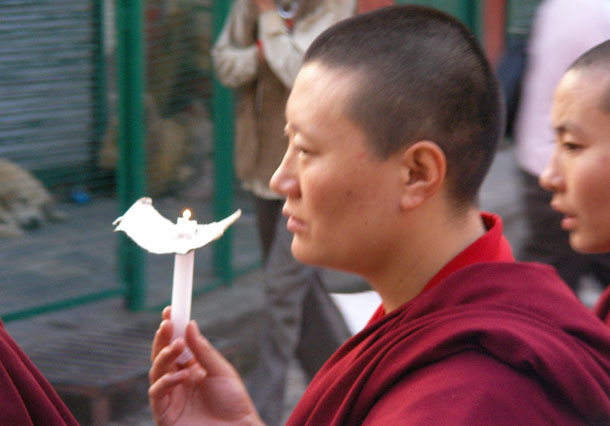 Dharamshala: Five major Tibetan NGOs express its deep concern over the tragic events that are unfolding in East Turkistan (Ch: Xinjiang). We call on the government of China to release those who have been detained for peaceful protest, restore internet and mobile telephone communication to Urumqi, permit unfettered access to journalists, cease its propaganda campaign that is contributing to the violence, and allow the United Nations to conduct an independent investigation. We also send our message of solidarity to Rebiya Kadeer and to members of the World Uyghur Congress at this tragic time.
Dharamshala: Five major Tibetan NGOs express its deep concern over the tragic events that are unfolding in East Turkistan (Ch: Xinjiang). We call on the government of China to release those who have been detained for peaceful protest, restore internet and mobile telephone communication to Urumqi, permit unfettered access to journalists, cease its propaganda campaign that is contributing to the violence, and allow the United Nations to conduct an independent investigation. We also send our message of solidarity to Rebiya Kadeer and to members of the World Uyghur Congress at this tragic time.As with the peaceful protests that spread across Tibet last year, the Chinese Government is following the same approach it used to "manage" the situation there including:
* tightly controlling foreign media (some of whom are in Urumqi on a government-organised tour).
* shutting down internet and mobile telephone access to prevent information getting out of the region and control what its own citizens are told about events.
* conducting night-time raids which have led to the arrests of many hundreds of people.
* flooding news broadcasts with images and statements that present protestors solely as violent rioters, thereby inciting ethnic conflict (see note 1).
- without proof, blaming the expression of legitimate grievances on "hostile foreign forces" (in East Turkestan's case, Rebiya Kadeer and the World Uyghur Congress; in Tibet's case, the Dalai Lama and his followers).
"We echo Rebiya Kadeer's urgent call for peace, justice and the end of all violence and appeal to the Chinese government to end its brutal suppression of Uyghurs throughout East Turkestan", said Ven. Ngawang Woeber, spokesperson of the five NGOs. "In a successive turn of events, Preisdent Hu Jintao is impelled to skip the G8 summit and head back to China from Pisa airport to safe his face from embarrassment during the G8 summit. This face-saving measure to avoid facing the international media and being swamped with questions, projects utter failure in the policy adopted by Chinese government in East Turkestan and for that matter in Tibet as well."
Despite China's occupation of Tibet and East Turkestan for over half a century, Tibetans and Uygurs have never accepted Chinese rule and continue to advocate for basic freedom and human rights. By denying Tibetans and Uyghurs control over their own lives, the Chinese government's policies in Tibet and East Turkestan are destroying stability, not creating it.
Sixteen months after a wave of overwhelmingly peaceful protests began to sweep across the Tibetan plateau, Tibet remains under virtual martial law, with more than 1,000 people still unaccounted for, who were detained during the period of unrest. More than 200 Tibetans have been killed during the protests and hundreds more arrested and sentenced, including four men and one woman sentenced to death for taking part in the protests in Lhasa on 14 March 2008.
We fear that, as in Tibet, the Chinese authorities will ascend their crackdown in East Turkestan with lengthy prison sentences, disappearances and beatings. As with Tibet, we call on the international community to press the government of China to work sincerely towards bringing about a peaceful resolution to the 50-year long occupation of East Turkestan.
Note 1: A report published by the Gongmeng Institute in Beijing recently pointed out how the Chinese government's virulent propaganda campaign over the Tibetan protests on 14 March 2008 stoked divisions between Chinese and Tibetans. The report said: "The ensuing over-propagandizing of "violence" was used to make the 3.14 incident ever larger, which created certain oppositional ethnic sentiments... Such propaganda actions are in the long run detrimental to ethnic unity. The fascination that Han citizens have expressed toward Tibetan culture changed to fear and hatred of the Tibetan masses."


![Tibet has a rich history as a sovereign nation until the 1950s when it was invaded by China. [Photo: File]](/images/stories/Pics-2024/March/Tibet-Nation-1940s.jpg#joomlaImage://local-images/stories/Pics-2024/March/Tibet-Nation-1940s.jpg?width=1489&height=878)















